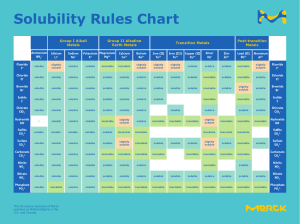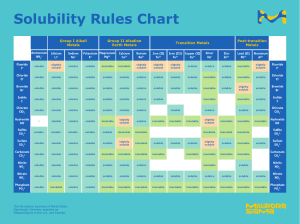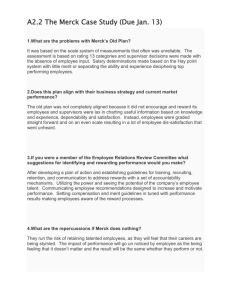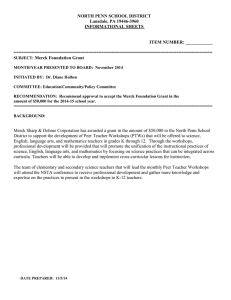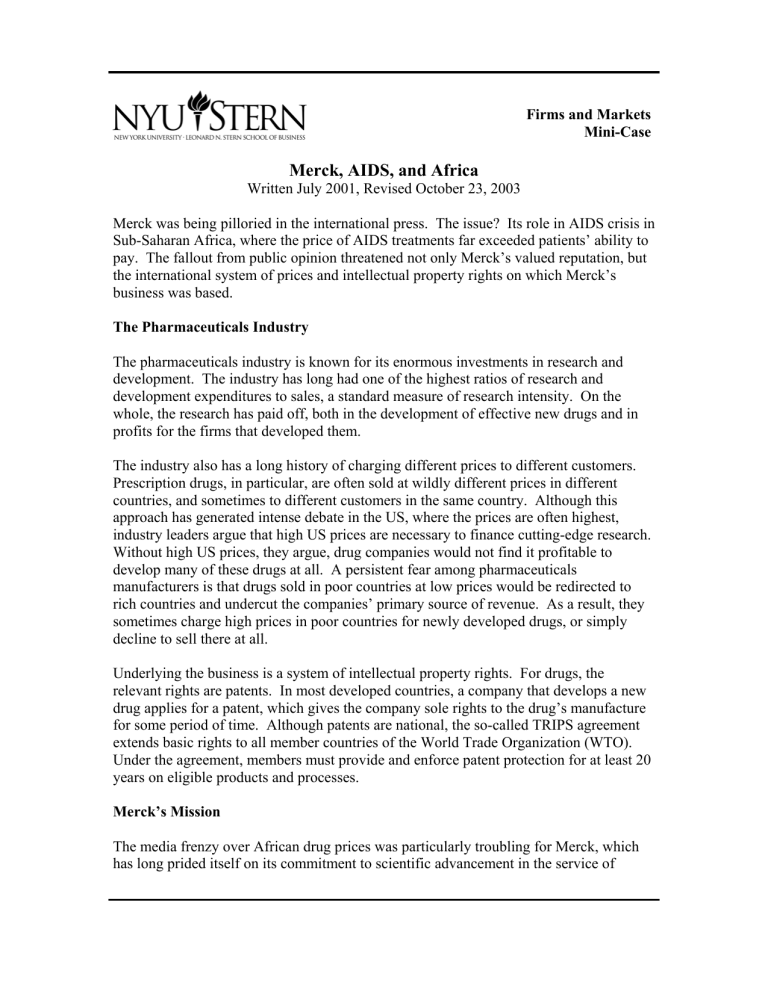
Firms and Markets Mini-Case Merck, AIDS, and Africa Written July 2001, Revised October 23, 2003 Merck was being pilloried in the international press. The issue? Its role in AIDS crisis in Sub-Saharan Africa, where the price of AIDS treatments far exceeded patients’ ability to pay. The fallout from public opinion threatened not only Merck’s valued reputation, but the international system of prices and intellectual property rights on which Merck’s business was based. The Pharmaceuticals Industry The pharmaceuticals industry is known for its enormous investments in research and development. The industry has long had one of the highest ratios of research and development expenditures to sales, a standard measure of research intensity. On the whole, the research has paid off, both in the development of effective new drugs and in profits for the firms that developed them. The industry also has a long history of charging different prices to different customers. Prescription drugs, in particular, are often sold at wildly different prices in different countries, and sometimes to different customers in the same country. Although this approach has generated intense debate in the US, where the prices are often highest, industry leaders argue that high US prices are necessary to finance cutting-edge research. Without high US prices, they argue, drug companies would not find it profitable to develop many of these drugs at all. A persistent fear among pharmaceuticals manufacturers is that drugs sold in poor countries at low prices would be redirected to rich countries and undercut the companies’ primary source of revenue. As a result, they sometimes charge high prices in poor countries for newly developed drugs, or simply decline to sell there at all. Underlying the business is a system of intellectual property rights. For drugs, the relevant rights are patents. In most developed countries, a company that develops a new drug applies for a patent, which gives the company sole rights to the drug’s manufacture for some period of time. Although patents are national, the so-called TRIPS agreement extends basic rights to all member countries of the World Trade Organization (WTO). Under the agreement, members must provide and enforce patent protection for at least 20 years on eligible products and processes. Merck’s Mission The media frenzy over African drug prices was particularly troubling for Merck, which has long prided itself on its commitment to scientific advancement in the service of humanity. Its current mission statement includes: “Our business is preserving and improving human life. … We value above all our ability to serve everyone who can benefit from the appropriate use of our products and services, thereby providing lasting consumer satisfaction.” Merck’s actions appear to back up its lofty mission. After World War II, Merck sold much-needed antibiotic streptomycin at cost in Japan when patients there couldn’t afford to pay more. More recently, they gave away millions of units of Mectizan, a drug that cures river blindness. (Both examples are from Collins and Porras, Built to Last, p 47.) AIDS, Africa, and Drugs Over 25 million people in Sub-Saharan Africa have HIV, out of approximately 36 million people worldwide. In 2000, more than 3.8 million people in the region were newly infected, making the issue a top priority for the World Health Organization, AIDS activist groups, and the United Nations. According to The New York Times, only 10,000 of those infected in Africa were getting the medicines they need. The majority of AIDS therapy today takes the form of triple-therapy drug “cocktails,” in which a patient takes a combination of three different AIDS drugs, which might include Crixivan (Merck), Stocrin (Merck), Zerit (Bristol-Myers), Videx (Bristol-Myers), and Viramune (Boehringer-Ingelheim). In the United States, the typical cost of a triple-therapy drug cocktail is about $10,000 per year, a figure far beyond the reach of African patients. For years, pharmaceutical manufacturers held discussions with various African nations regarding the sale of lower priced pharmaceuticals, but by January of 2001 only a small number of countries were believed to have reached agreements with drug companies. Competition and Response In February 2001, Cipla, an Indian manufacturer of generic pharmaceuticals, offered to supply a triple-therapy AIDS drug cocktail for $350 per year to Medecins sans Frontieres (Doctors Without Borders), a nonprofit medical group. Another Indian drug producer, Hetero Drugs Ltd., was reported to offer the same cocktail for $347 per year. Many observers felt that both drugs violated patents on the original drugs. Cipla aggressively targeting the AIDS market in Africa by offering drugs at much lower cost than US and European companies. Cipla offered a triple-therapy drug cocktail to African nations for approximately $600, undercutting the first round of discounts by the Western drug producers. In March 2001, Bristol-Myers Squibb and Merck each made significant price concessions on their AIDS drugs sold in Africa. Bristol-Myers Squibb announced that it would sell two drugs at slightly below cost and that it would not use its Zerit patents to block generic manufacturers (such as Cipla) from selling Zerit knockoffs in the region. Merck, AIDS, and Africa Page 2 Bristol-Myers Squibb sold Zerit and Videx for a combined price of $365 annually; Merck offered to sell its AIDS drugs at cost. The new price in Africa of Crixivan, Merck’s protease inhibitor, is about $600 – about one-tenth the price of the drug in the US. Merck’s Stocrin drug now costs $500 annually in Africa. A typical three-drug regimen would include Zerit and Videx combined with Crixivan or Viramune (which costs $438 per year) from Boehringer-Ingelheim. But even the new, lower cost of a typical drug cocktail in Africa – between $803 and $965 annually, depending on which drugs are included – was higher than the price Cipla offered to African nations (about $600 per year, according to The Wall Street Journal). Lawsuit in South Africa In South Africa, where roughly 20% of adults carry the virus, 39 drug companies sued the government to prevent South Africa from importing generic AIDS drugs such as the ones produced by Cipla. One of the concerns of the Western drug companies was that such imports would effectively eliminate their patent rights in South Africa. (Cipla asked the South African government to grant it compulsory licenses to make and sell 8 different drugs that were currently protected by patents.) According to the St. Louis PostDispatch, the President of Cipla, Dr. Yusuf Hamied, asked the pharmaceutical companies for permission to manufacture their patented drugs under license, but they did not respond. Hamied then asked the South African government to unilaterally grant his company a license, and offered to pay 5% royalties. Name-brand companies criticized this plan. Per Wold-Olsen, Merck President for Europe, the Middle East and Africa, commented in The New York Times, “They [Cipla] are stealing my intellectual property, and I cannot accept that.” A South African official at Boehringer Ingelheim commented, “If they accuse us of abusing our patent position, we can only say that we have offered the governments of all developing countries preferential pricing.” In April 2001, days before the lawsuit was to begin and under significant worldwide pressure, the companies dropped their case. Before the suit was dropped, South Africa considered another approach. Under WTO guidelines, if a government declares the AIDS epidemic a “national emergency,” it can override existing patents and allow production and sale of generic versions. Taking the step of declaring the epidemic a national emergency would have given the South African government more latitude than even successfully defending the lawsuit, according to the Washington Post. However, on March 15, 2001, the President Thabo Mbeki chose not to declare the AIDS epidemic a national emergency. According to the Washington Post, Mbeki’s decision was based on concern over the perception that the government was ignoring property rights and the effect this would have on foreign investment. He also notes that WTO guidelines called for declaring a state of emergency “only to restore peace and order” and that “no such threats to the country’s security existed.” Merck, AIDS, and Africa Page 3 US Repercussions Meanwhile, pharmaceuticals executives worried that such low prices abroad would lead to similar demands in the US. “We should tell the American consumer, ‘You can have the same deal when you are living on a dollar a day,’” an official at the World Health Organization was quoted as saying in The Washington Post. Raymond Gilmartin, Chairman of Merck, was quoted in The Wall Street Journal as saying, “We’re making a big assumption here that the American people and Congress will look at our discussions in Africa and realize that they should not be part of the debate about prices in other parts of the world.” Postscript Merck and other major pharmaceuticals companies have come to agreement with South Africa and other poor countries to sell drugs to them at or near marginal cost. They also worked with international organizations to build health systems in which their drugs could be used effectively. A number of reports emerged of drugs targeted for poor countries reappearing in Europe and the US at reduced prices. Questions (a) What is Merck’s business model? How does it make money? (b) What are the advantages to Merck of selling AIDS drugs at cost in South Africa? Disadvantages? (c) Bottom line: What should Merck do? (d) Can you think of analogous situations in this industry? Other industries? Additional Information Boehringer-Ingelheim: http://www.boehringer-ingelheim.com/ Bristol-Myers Squibb: http://www.bms.com/ Cipla: http://www.cipla.com/ Medecins Sans Frontieres: http://www.accessmed-msf.org/ Merck: http://www.merck.com/ World Health Organization: http://www.who.int/home-page/ World Trade Organization: http://www.wto.org/ Notes Charles Miller and Kenneth Goldman prepared this case under the supervision of Mariagiovanna Baccara, David Backus, Heski Bar-Isaac, Luís Cabral, and Lawrence White for the purpose of class discussion rather than to illustrate either effective or ineffective handling of an administrative situation. © 2003 NYU Stern School of Business. Merck, AIDS, and Africa Page 4
